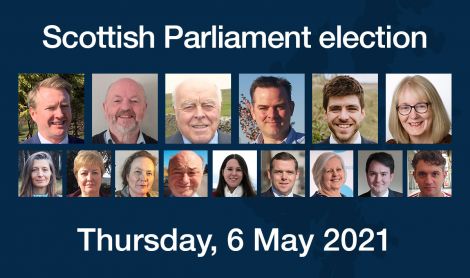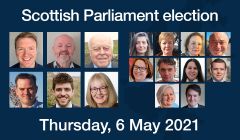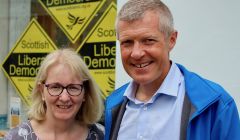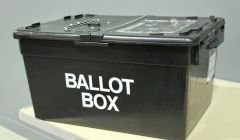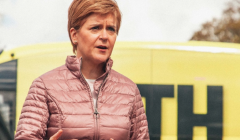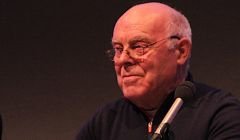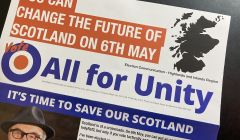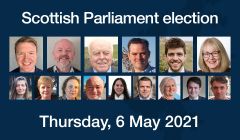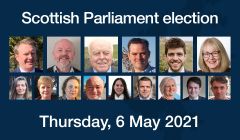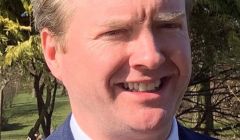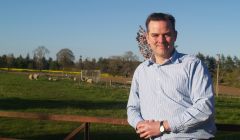Election / Online hustings notable for absence of confrontation
SNP candidate Tom Wills says an independence referendum is “nowhere near” the top of his priorities – while Liberal Democrat opponent Beatrice Wishart feels the impact of Covid-19 will be felt for “many years” and focusing on independence will “do nothing to hasten our recovery”.
The two frontrunners for the Shetland seat in the 6 May Scottish Parliament election were speaking during a remotely-recorded election hustings broadcast by BBC Radio Shetland on Wednesday evening.
They were joined by Labour candidate Martin Kerr, Conservative hopeful Nick Tulloch, Restore Scotland’s Brian Nugent and independent candidate Peter Tait for the hour-long discussion.
Hosted in the firm but fair manner you’d expect from seasoned BBC station manager John Johnston, the even-tempered debate – held over Zoom – was notable for an absence of confrontation and a fair amount of consensus between the candidates on several issues.
Wills did refer to there being “more wallabies in Shetland than there are Lib Dem MSPs in Holyrood”, but combative moments were conspicuous by their absence as the candidates put across their perspectives on tourism, independence, fishing, crofting, same-sex marriage and tunnels.
Amid agreement regarding Marine Scotland’s heavy-handed approach towards local fishing vessels, Wishart joked “it’s going to sound like a Wills and Wishart love-in here” shortly after Wills had noted “Beatrice teed me up nicely there”.
Scotland’s constitutional future notwithstanding, there has long been a considerable degree of policy crossover between the SNP and the Lib Dems.
Wills referred to “a lot of common ground” in their respective desire to build a fairer society, but said that as a “fringe party of five” at Holyrood it was hard to see how the Lib Dems were “going to deliver any of their no doubt worthy commitments” on devolution.
He said the SNP favoured putting the matter to the Scottish people “as soon as we’re out of the pandemic” but “an immediate referendum is nowhere near the top of my priorities”.
Become a member of Shetland News
Wills wants greater use of the Islands Act to exert more local say over issues such as HIAL’s centralisation of air traffic control, the Northern Isles ferry contract and control of the waters around Shetland.
“I think there’s been a lot of centralisation from Thatcher onwards, and some of it has happened under the SNP’s watch,” Wills acknowledged.
“I think we as a community in Shetland should be pushing back on that, and the Scottish Government have provided a mechanism for us to do so through the Islands Act. However, the SIC has yet to use that mechanism.
“We need to decide as a community what we want, and we need to use the existing mechanisms that are available to get what we want.”
Wishart said she felt there had been “so much infighting” in Scottish politics, and specifically within the SNP, that the country had become “stuck in a rut”.
In terms of the timing of a second independence referendum, which the Lib Dems oppose, she asked: “I don’t know when [we hear] this phrase of ‘when the pandemic is over’ – when is that?
“The impact of Covid is going to go on for many, many years to come. It’s not as if we’re going to wake up one morning and suddenly find it’s all over. I think the focus on independence will do nothing to hasten our recovery.”
Wishart, who has served at Holyrood since comfortably winning the August 2019 by-election, said political arrangements needed to be designed to suit different parts of the country: “What suits Shetland doesn’t always suit the one-size-fits-all that comes from the central belt.”
She added that local authorities had been “held back because of real-term cuts over the years”, while she was also concerned about “ringfencing” of funding which made life difficult for councils.
Labour candidate Kerr shared her view that a referendum would be an unwanted distraction amid “a recovery that will take many years” and would neither help vaccinate anyone quicker nor “pull one family out of poverty”.
Tulloch recalled the “division caused across family, friends, businesses” during the 2014 referendum campaign and pointed to the UK’s successful vaccine rollout and the furlough scheme as highlighting “the benefits of being part of the union”.
Tait was the fourth of the six candidates to oppose a referendum, while Nugent wants to see a second poll but criticised Wills’ party over the lack of any mention of independence in three SNP campaign leaflets.
Candidates were also asked by James Anderson, skipper of local whitefish boat the Alison Kay, whether they would seek to return the management of fisheries to the EU.
Wishart said decisions about fishing must place fishermen at the “absolute centre” to ensure “an open and ready route from catch to market”. While the Lib Dems were avowedly anti-Brexit, that did not mean the party would prioritise rejoining the EU.
The SNP wants an independent Scotland to become an EU member, but Wills said he would still oppose membership of the much-maligned Common Fisheries Policy (CFP): “Personally there is no way I could vote for the CFP as it stands,” he said.
Nugent – whose party wants independence from both the UK and Europe – took Wills to task on that point, saying he “won’t have the option” and to suggest otherwise was “completely wrong”.
The SNP candidate countered that the constitutional question was not so much about independence as “degrees of interdependence” and as a species “we need more international cooperation”.
There was broad consensus opposing what NFU Shetland policy officer Lorna Scott described as a “flurry of proposals” on transporting livestock and the storage of slurry and silage that could impose greater costs on crofters and farmers.
Wishart said it was crucial to avoid a repeat of difficulties faced by seafood exporters in January when it comes to the season for exporting lamb in the autumn.
Asked by Shetland Tourism Association chairwoman Emma Miller what they would to help tourism and hospitality recover from Covid-19, Kerr said a combination of vaccination and testing prior to travel was the answer.
“We need to get tourists and cruise liners back in Shetland waters but we can only do so when it’s safe to do so,” he said, highlighting a Labour policy to fund a free third night for anyone holidaying domestically between September and November.
Nugent wants “staycations” for “at least a number of years” due to uncertainty over foreign travel, while Tait urged caution over reopening due to a fear that “if we allow liners to come it could easily bring in the Coronavirus again and we might be subject to another lockdown”.
Wishart and Wills were the only candidates to have already signed a Scottish LGBTI pledge card for equality, though both Kerr and Tulloch said they would do so without hesitation.
Tait faced further criticism for his opposition to gay marriage (“historically Shetland has been quite a difficult place to be gay… and Peter is not helping with that”, said Wills).
“I’m still standing on the same thing anyway, I’m not changing my mind,” Tait responded, having earlier referred to “drifting away from the laws of God” and denied having connected the issue with the Covid-19 pandemic.
A final question, from Yell Community Council, asked candidates if they would support building tunnels to connect smaller islands to the Shetland mainland.
Wills said Shetland should have followed Faroe and Norway long ago and “by whatever means necessary I’ll be pushing for it to happen” – a view shared by Wishart, who also cited Faroe as a positive example of “being able to bring your community closer”.
Kerr and Tulloch echoed those sentiments, while Nugent suggested Shetland Charitable Trust funds were “sitting doing nothing” when the money “could be out there building tunnels [and] insulating homes”. Tait, too, was in favour of tunnels but it felt “a bit unrealistic” unless government regulations were changed.
Johnston told Shetland News it had been a “different election for everybody due to the pandemic” and the station had adopted “new and innovative ways to keep our listeners informed”.
“Despite not being able to hold a constituency hustings in front of a live audience we’ve still invited questions from the public… and cross-examined each of the candidates on their policies,” he said.
BBC Radio Shetland will also broadcast a second selection hustings on Thursday (22 April) from Inverness featuring candidates on the Highlands and Islands regional list.
- You can listen to the BBC’s Shetland election hustings programme in full here.
Become a member of Shetland News
Shetland News is asking its many readers to consider paying for membership to get additional features and services: -
- Remove non-local ads;
- Bookmark posts to read later;
- Exclusive curated weekly newsletter;
- Hide membership messages;
- Comments open for discussion.
If you appreciate what we do and feel strongly about impartial local journalism, then please become a member of Shetland News by either making a single payment, or setting up a monthly, quarterly or yearly subscription.


































